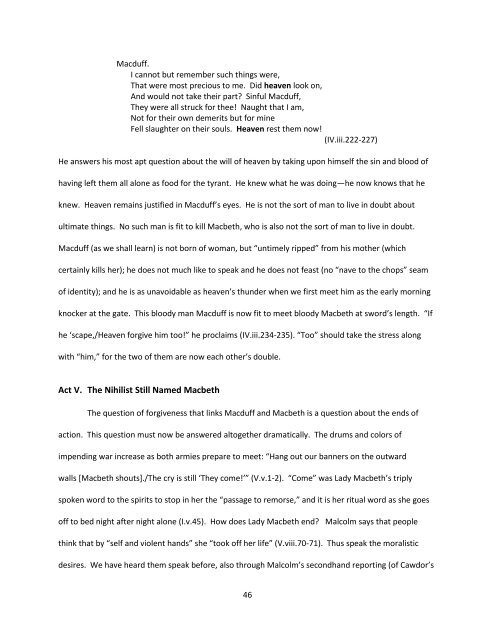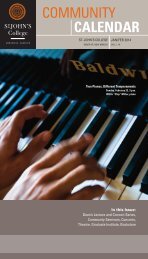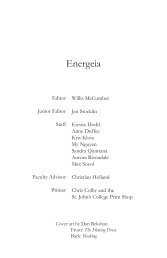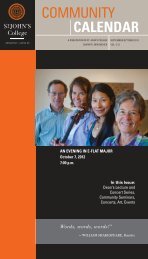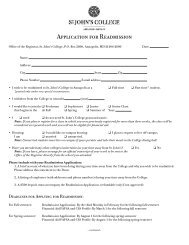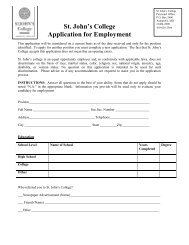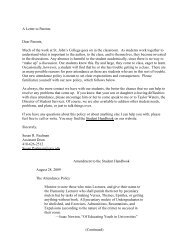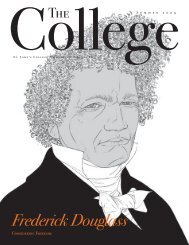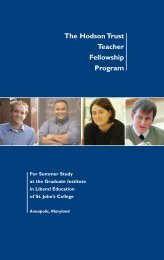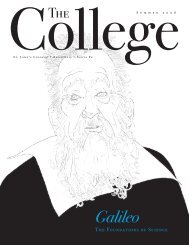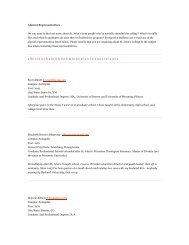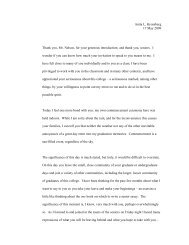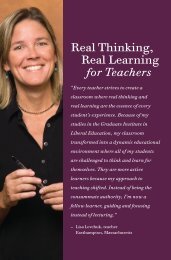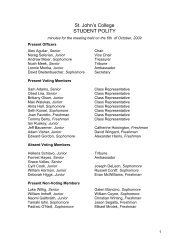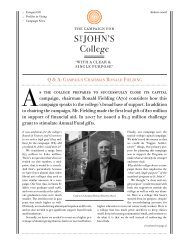âTo Meet with Macbeth,â given by tutor Louis ... - St. John's College
âTo Meet with Macbeth,â given by tutor Louis ... - St. John's College
âTo Meet with Macbeth,â given by tutor Louis ... - St. John's College
Create successful ePaper yourself
Turn your PDF publications into a flip-book with our unique Google optimized e-Paper software.
Macduff.<br />
I cannot but remember such things were,<br />
That were most precious to me. Did heaven look on,<br />
And would not take their part? Sinful Macduff,<br />
They were all struck for thee! Naught that I am,<br />
Not for their own demerits but for mine<br />
Fell slaughter on their souls. Heaven rest them now!<br />
(IV.iii.222-227)<br />
He answers his most apt question about the will of heaven <strong>by</strong> taking upon himself the sin and blood of<br />
having left them all alone as food for the tyrant. He knew what he was doing—he now knows that he<br />
knew. Heaven remains justified in Macduff’s eyes. He is not the sort of man to live in doubt about<br />
ultimate things. No such man is fit to kill <strong>Macbeth</strong>, who is also not the sort of man to live in doubt.<br />
Macduff (as we shall learn) is not born of woman, but “untimely ripped” from his mother (which<br />
certainly kills her); he does not much like to speak and he does not feast (no “nave to the chops” seam<br />
of identity); and he is as unavoidable as heaven’s thunder when we first meet him as the early morning<br />
knocker at the gate. This bloody man Macduff is now fit to meet bloody <strong>Macbeth</strong> at sword’s length. “If<br />
he ‘scape,/Heaven forgive him too!” he proclaims (IV.iii.234-235). “Too” should take the stress along<br />
<strong>with</strong> “him,” for the two of them are now each other’s double.<br />
Act V. The Nihilist <strong>St</strong>ill Named <strong>Macbeth</strong><br />
The question of for<strong>given</strong>ess that links Macduff and <strong>Macbeth</strong> is a question about the ends of<br />
action. This question must now be answered altogether dramatically. The drums and colors of<br />
impending war increase as both armies prepare to meet: “Hang out our banners on the outward<br />
walls [<strong>Macbeth</strong> shouts]./The cry is still ‘They come!’” (V.v.1-2). “Come” was Lady <strong>Macbeth</strong>’s triply<br />
spoken word to the spirits to stop in her the “passage to remorse,” and it is her ritual word as she goes<br />
off to bed night after night alone (I.v.45). How does Lady <strong>Macbeth</strong> end? Malcolm says that people<br />
think that <strong>by</strong> “self and violent hands” she “took off her life” (V.viii.70-71). Thus speak the moralistic<br />
desires. We have heard them speak before, also through Malcolm’s secondhand reporting (of Cawdor’s<br />
46


